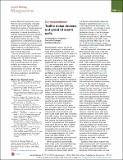Traffic noise drowns out great tit alarm calls
Abstract
Anthropogenic noise is one of the fastest growing and most ubiquitous types of environmental pollution and can impair acoustic communication in a variety of animals [1]. Recent research has shown that birds can adjust acoustic parameters of their sexual signals (songs) in noisy environments 2 and 3, yet we know little about other types of vocalizations. Anti-predator signals contain subtle information that is critical for avoiding predation 4 and 5, and failure to detect these calls 6 and 7 as a result of anthropogenic noise pollution could have large fitness consequences by negatively impacting survival. We investigated whether traffic noise impacts both the production and perception of avian alarm calls using a combination of lab and field experiments with great tits (Parus major), a songbird that frequently inhabits noise-polluted environments. In response to experimental noise manipulation in controlled laboratory conditions, great tits increased the amplitude, but not the frequency parameters, of their mobbing alarm calls (hereafter ‘alarm calls’). Playback experiments conducted in the wild indicate that current levels of road traffic noise mask alarm calls, impeding the ability of great tits to perceive these critical signals. These results show that, despite the vocal adjustments used to compensate for anthropogenic noise, great tits are not able to restore the active space of their calls in even moderately noisy environments. Consequently, birds are likely to suffer from increased predation risk under noise, with likely effects on their behaviour, populations, and community dynamics in noise-polluted areas.
Citation
Templeton , C N , Zollinger , S A & Brumm , H 2016 , ' Traffic noise drowns out great tit alarm calls ' , Current Biology , vol. 26 , no. 22 , pp. R1173-R1174 . https://doi.org/10.1016/j.cub.2016.09.058
Publication
Current Biology
Status
Peer reviewed
ISSN
0960-9822Type
Journal article
Description
This research was funded by fellowships and grants from NERC (NE/J018694/1), the Royal Society (RG2012R2), MJ Murdock Charitable Trust (2014199), and the German Research Foundation (Br2309/7N1 and Br2309/8N1).Collections
Items in the St Andrews Research Repository are protected by copyright, with all rights reserved, unless otherwise indicated.

